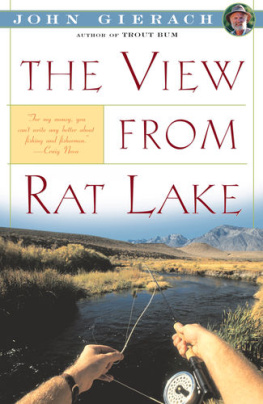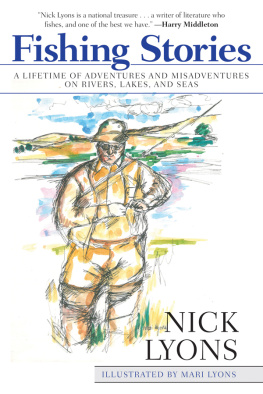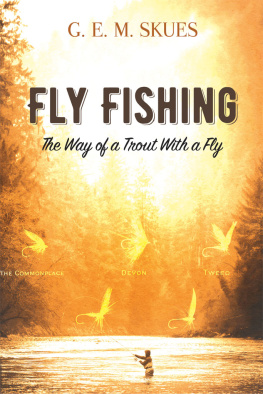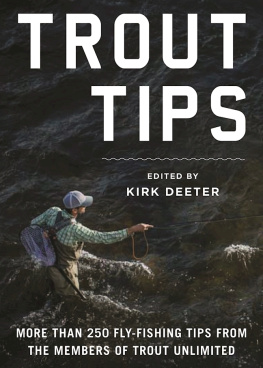The next best thing to fly-fishing is reading John Gierachs essays about it. Nobody understands better the fine line between healthy passion and clinical pathology that we anglers so comically tread.C ARL HIAASEN

0-671-64413-0

0-684-86329-4

0-671-77910-9

0-671-77920-6

0-684-86859-8

0-671-75455-6

0-671-67581-8

0-684-83147-3

0-671-68437-X

0-7432-2993-2

SIMON & SCHUSTER
PAPERBACKS
A VIACOM COMPANY www.SimonandSchuster.com
FARM PONDS
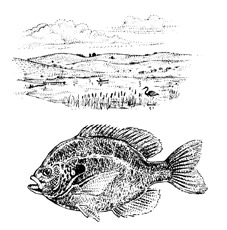
I THINK THE FIRST FISH I ever caught was a bluegill from a pond on my uncles farm in Indiana, but I cant be absolutely sure. Youd think that would be something youd never forgetlike any number of other firsts I could mentionbut although that memory would be no more than about forty years old now, it has become obscured by subsequent fish, of which, I have to say, there have been quite a few.
I suppose my first fish could just as easily have been a little bullhead from the creek at home, but theres something about that pond I cant get out of my mind.
I remember it as small, so, given the propensity of things from childhood to loom larger than they really were, it must have been tinymaybe a few acres at the most. There were cattails growing at the shallow end and the water near the dike was deep enough to swim in, though I never thought it was all that inviting. There were too many weeds and sticks that seemed to want to grab you, and there was this morbid curiosity I had about what else might be down there. I never did get to be much of a swimmer.
The pond stood out in the open not far from the house; a low, unimpressive disk of water you could see from a long way off. Its banks were grazed-over pasture trampled to mud, and there were no trees for shade. The water was clear, though. I can remember wading in the shallows and watching the crawdads skitter along the bottom in front of me. Usually Id spot their trails of silt first, then the creatures themselves. Eventually I overcame my fear of the pincers enough to try and catch them by hand, at least the little ones that were around in the spring. It wasnt easy.
There wouldnt have been much in the way of natural structure in the pond. It was set in a shallow draw with a seasonal stream running through it, so the bottom would have been shaped like an elongated bowl. But I think I recall Uncle Leonard sinking some old tires and brush in there for fish habitat. Leonard was a serious fisherman and knew about those things. I dont think they referred to it as structure then. I think they just called it old tires and slash. They didnt call it habitat, either. They just said the fish liked it.
One thing I remember clearly is the electric fence you had to cross to get to the pond. Uncle Leonardbeing an advocate of one-trial learninglet me go ahead and touch it so Id know why I was being told not to touch it. Leonard once told me, Dogs and kids arent good with ideas, but they learn well from experience.
In the beginning at least, I fished the pond with a stick, string and worm, along with my cousins Rod and Shorty (Roger and Norma Jean to company). All we knew about fishing was, if you put a worm on a hook and sank it in the water, a fish might eventually come along and eat it. We didnt understand that exactly where in the water, let alone when, might make a difference.
Mostly we got little sunfish, and not too many of those. I know now thats because we mostly fished in the wrong places and because we usually did it in the middle of the dayat the worst possible time.
Leonard, of course, had the thing wired. Hed go out to the pond by himself and come back in an hour or so with enough big bass for supper. These were fish of a size and kind Id never gotten myself, even though Id spent a fair amount of time on the same pond. They also reinforced that suspicion that kept me from wanting to swim: the idea that there were things in the water you might not know about. I was astonished. Clearly, there was more to all this than Id thought.
Leonard fished in the evenings when it was cool and the light was off the water, or sometimes at night when we kids were getting ready to go to bed. We assumed he went out then because that was when the work was finished.
Sometimes he used worms just like we did, but there were also minnows, crawdads, frogs, grubs, crickets and grasshoppers in evidence from time to time. He said that, yes, the kind of bait could make a difference, but added, That aint all there is to it.
Right, I could see that.
And sometimes he used these plugs with shiny metal scoops and blades on them and painted eyes and scales. Except for the dangling hooks, they had the bright look of toys. I liked them a lot but, although I could see they were supposed to be frogs or minnows, I couldnt believe a fish would actually mistake them for the real thing. Unless this was some kind of elaborate joke (which was always a possibility), Leonard must be right when he said, Fish dont think like we do.
EVENTUALLY, Leonard showed me how it was done, or, rather, he let me come along and watch and pick up what I could, provided I could keep quiet and stay more or less out of the way. Hed never lecture, but hed try to answer whatever questions I felt like asking because the type of question would indicate how much information I was able to absorb. That way I didnt get confused and he didnt have to talk any more than was absolutely necessary.
Actually, Leonard was quite a talker most of the time, but on the water hed go into a trancelike silence for long periods of time. Adults still tell kids to be quiet so they dont scare the fish, but thats not the real reason. Its just hard to explain to a child that a kind of profound physical and mental stillness is required if you want to catch fish. Thats one of those things you have to come to on your own. Anyway, I learned not to chatter, and also to choose my questions well and ask them quietly.



